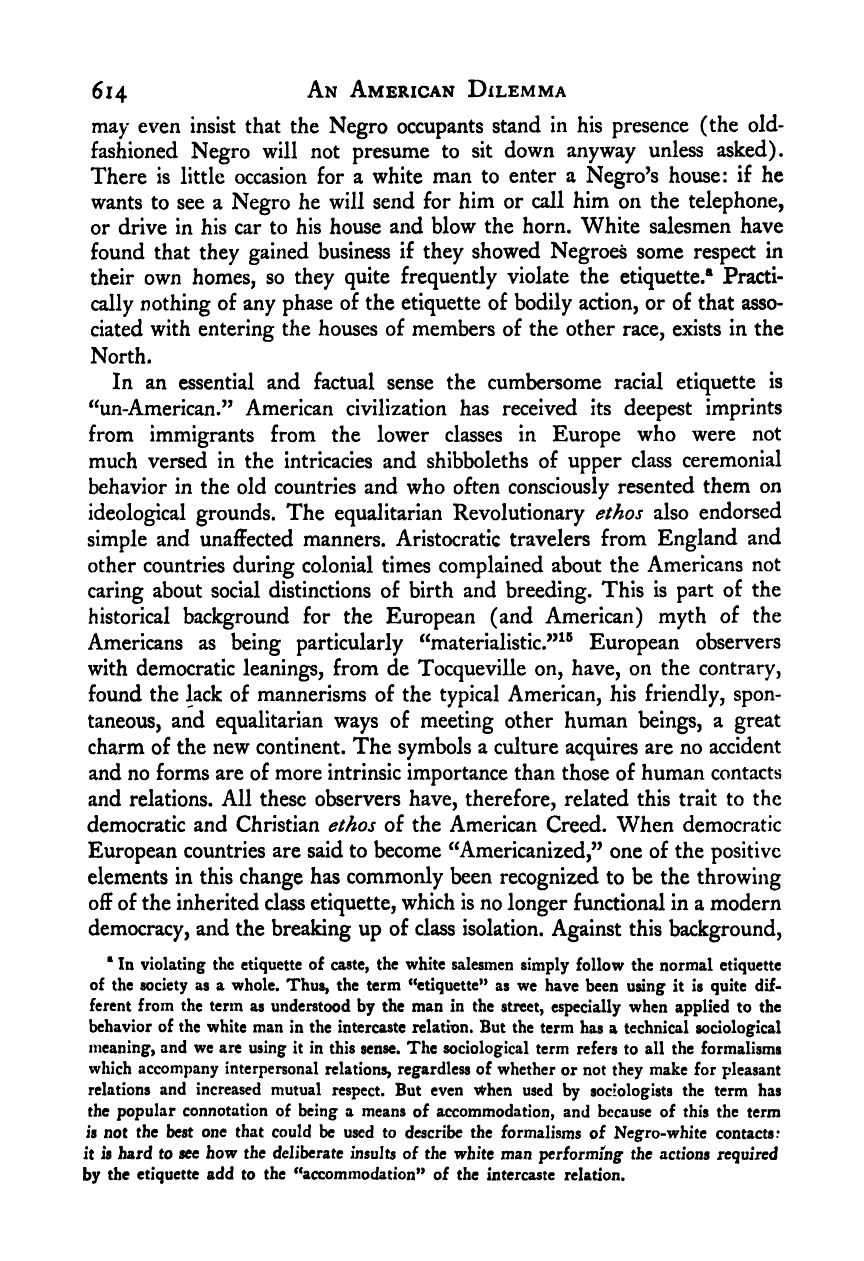Note: Gunnar Myrdal died in 1987, less than 70 years ago. Therefore, this work is protected by copyright, restricting your legal rights to reproduce it. However, you are welcome to view it on screen, as you do now. Read more about copyright.
Full resolution (TIFF) - On this page / på denna sida - VII. Social Inequality - 29. Patterns of Social Segregation and Discrimination - 2. Segregation and Discrimination in Interpersonal Relations

<< prev. page << föreg. sida << >> nästa sida >> next page >>
Below is the raw OCR text
from the above scanned image.
Do you see an error? Proofread the page now!
Här nedan syns maskintolkade texten från faksimilbilden ovan.
Ser du något fel? Korrekturläs sidan nu!
This page has never been proofread. / Denna sida har aldrig korrekturlästs.
6i4 An American Dilemma
may even insist that the Negro occupants stand in his presence (the old-
fashioned Negro will not presume to sit down anyway unless asked).
There is little occasion for a white man to enter a Negro’s house: if he
wants to see a Negro he will send for him or call him on the telephone,
or drive in his car to his house and blow the horn. White salesmen have
found that they gained business if they showed Negroes some respect in
their own homes, so they quite frequently violate the etiquette.® Practi-
cally nothing of any phase of the etiquette of bodily action, or of that asso-
ciated with entering the houses of members of the other race, exists in the
North.
In an essential and factual sense the cumbersome racial etiquette is
“un-American.” American civilization has received its deepest imprints
from immigrants from the lower classes in Europe who were not
much versed in the intricacies and shibboleths of upper class ceremonial
behavior in the old countries and who often consciously resented them on
ideological grounds. The equalitarian Revolutionary ethos also endorsed
simple and unaffected manners. Aristocratic travelers from England and
other countries during colonial times complained about the Americans not
caring about social distinctions of birth and breeding. This is part of the
historical background for the European (and American) myth of the
Americans as being particularly “materialistic.”^® European observers
with democratic leanings, from de Tocqueville on, have, on the contrary,
found the lack of mannerisms of the typical American, his friendly, spon-
taneous, and equalitarian ways of meeting other human beings, a great
charm of the new continent. The symbols a culture acquires are no accident
and no forms are of more intrinsic importance than those of human contacts
and relations. All these observers have, therefore, related this trait to the
democratic and Christian ethos of the American Creed. When democratic
European countries are said to become “Americanized,” one of the positive
elements in this change has commonly been recognized to be the throwing
off of the inherited class etiquette, which is no longer functional in a modern
democracy, and the breaking up of class isolation. Against this background,
* In violating the etiquette of caste, the white salesmen simply follow the normal etiquette
of the society as a whole. Thus, the term ‘‘etiquette” as we have been using it is quite dif-
ferent from the term as understood by the man in the street, especially when applied to the
behavior of the white man in the intercaste relation. But the term has a technical sociological
meaning, and we are using it in this sense. The sociological term refers to all the formalisms
which accompany interpersonal relations, regardless of whether or not they make for pleasant
relations and increased mutual respect. But even When used by sociologists the term has
the popular connotation of being a means of accommodation, and because of this the term
is not the best one that could be used to describe the formalisms of Negro-white contacts:
it is hard to see how the deliberate insults of the white man performing the actions required
by the etiquette add to the “accommodation” of the intercastc relation.
<< prev. page << föreg. sida << >> nästa sida >> next page >>